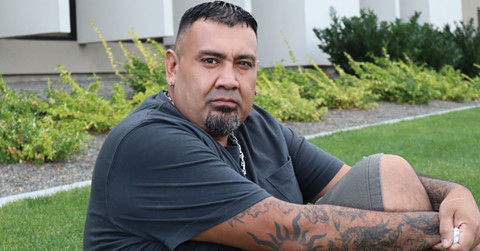All stories of recovery are unique. For Gino Lister, recovery has been a journey of falling (falling a lot and falling hard) but finding the courage to get back up.
When Gino was a child, he, his step-father (Gino’s primary father figure) and mother moved from the Yakama Nation to Boston. When he was young, his parents noticed his natural, athletic talent for playing baseball. They got him involved in little league, and he played in school—baseball became his life. When he was in high school, about to begin his freshman year of college on a full-ride scholarship to James Madison University, he tore his rotator cuff during a game.
“It was in the middle of a legion game, I went to throw a curve-ball and I felt something in my shoulder pop,” said Gino. “Then I felt a rip right when the ball was halfway up the backstop, and I went face first in the dirt.”
His coaches urged him to keep the injury quiet, but his shoulder needed surgery. After surgery, Gino tried to push through rehabilitation with little guidance on how to care for the injury, causing permanent damage and persistent pain. He started the year at James Madison, but his new coaches noticed something was different. They called him in to their office and he admitted he had been injured over the summer, and they told him to go home. His baseball career was over.
Gino was first exposed to illegal drugs at age 14, but never touched them. When his future became uncertain, he turned to using drugs as a way to cope with being forced to let go of his dream. He also turned to selling.
“I’m a smart guy, but I wasn’t exposed to many other careers. I was exposed to someone selling drugs though, and I thought I could do this and be good at it,” said Gino.
Gino found himself living a lie, hiding his occupation but making sure he was succeeding. He was arrested and sent to prison for eight and a half years, where his life changed dramatically. He acquired a traumatic brain injury during a fight, spent over seven months in solitary confinement, nearly lost his life, and nearly took his own life. He often wondered if he would die in prison. When he was released, his wife had moved on, taking any money he had before he was sentenced and he had nowhere to go. He called his mom, who was living in Yakima, and he went home.
When he relocated, he knew his life needed to change. He had a parole officer assigned to him and tried settling in, soon taking on the role of primary caregiver for his grandmother for some time before she passed away. A few months later, his father also passed. Once again, Gino was faced with difficult situations and significant losses and returned to using.
“I felt lost. I had promised my father I would stop using, and I wasn’t.”
By this time, Gino had been going to intensive outpatient treatment for his drug use, but he was reluctant to fully participate in treatment services and continued using. His counselor realized he was on a dangerous path that could lead him back to prison and suggested inpatient treatment. Gino went. Before inpatient treatment was over, his counselor arranged for a meeting with him, his mom, and his girlfriend. His mom was honest about the pain she was experiencing as she witnessed her child using illegal drugs, going to prison, nearly losing him and seeing him use again.
“I thought I was just hurting myself, I didn’t care about myself. But, I was hurting her.”
This was a turning point for Gino, he was determined to stop using and finish the program. And, he did. According to his counselor at Comprehensive Healthcare, Gino is an example of someone who was reluctant to engage in treatment at first, yet had experienced incredibly positive outcomes.
“I like myself. It’s been a long time since I have just been me.”
Gino dedicates much of his time to helping others. He gives haircuts to guys who are struggling with addiction and getting back on their feet, donates clothes to strangers he sees in town, and occasionally visits group sessions to motivate others through their recovery journey.
“I have a heart, you know? I always have.”
He is optimistic about his future, hoping to complete school; perhaps an EMT training program or finding another career path that involves helping others.
When we asked his counselor about Gino, she said, “I am so proud of him, because I know a part of him still believes that asking for help is not courage, but it is—and he did it!”



